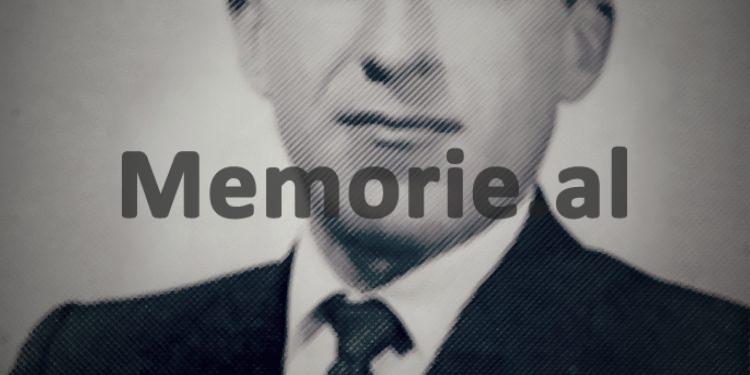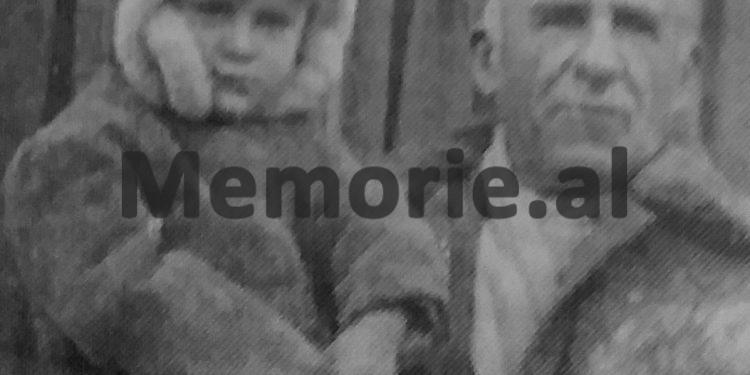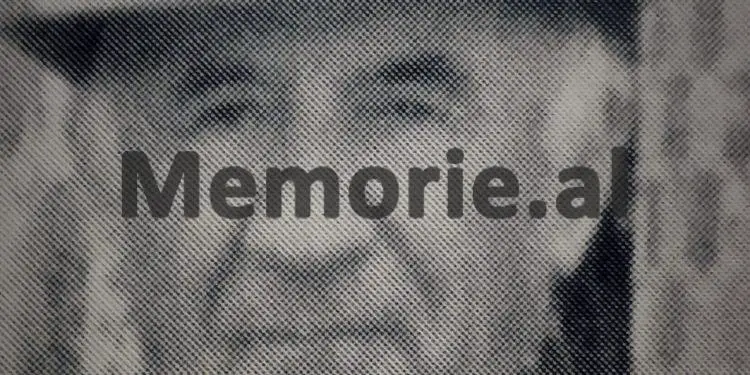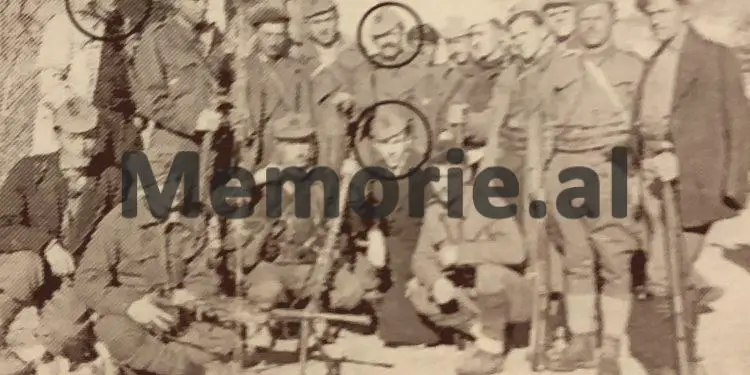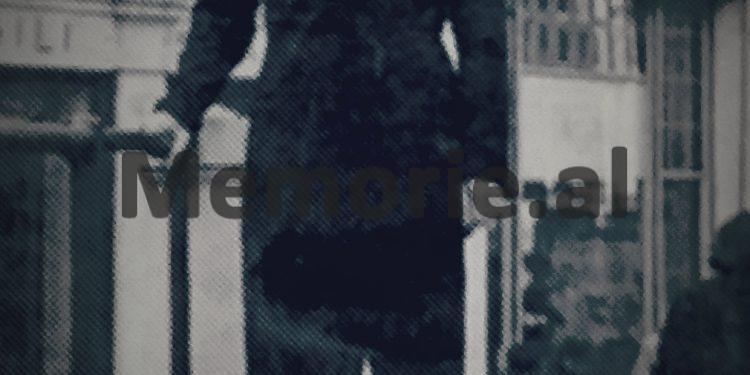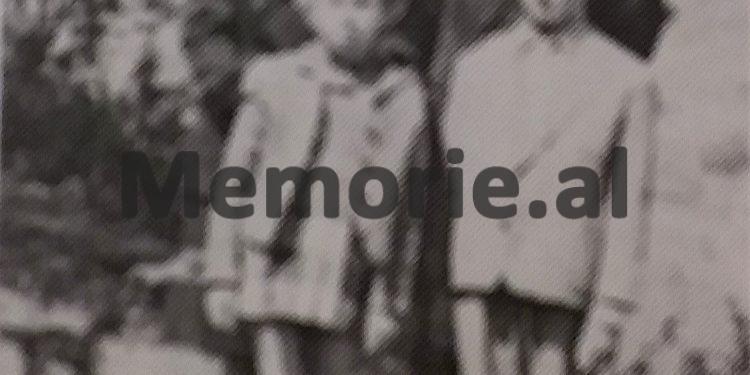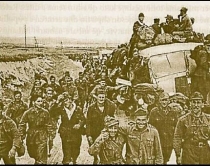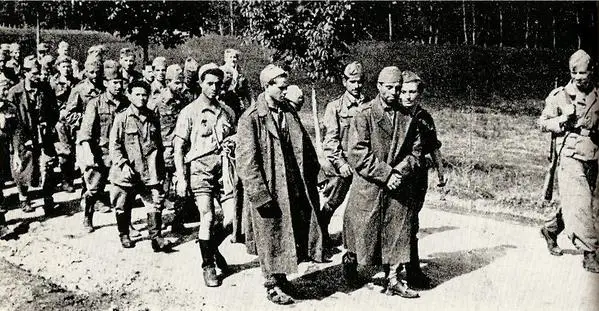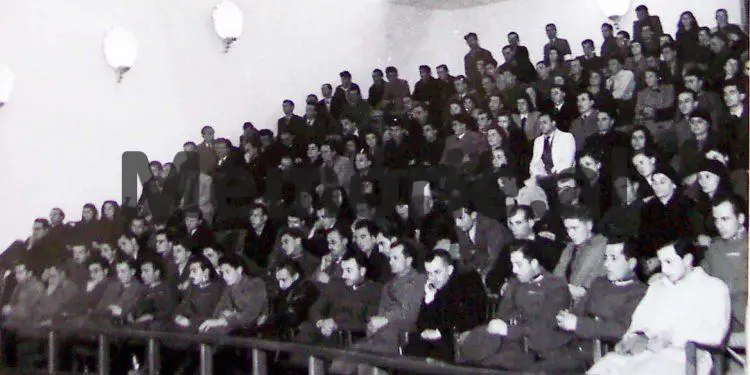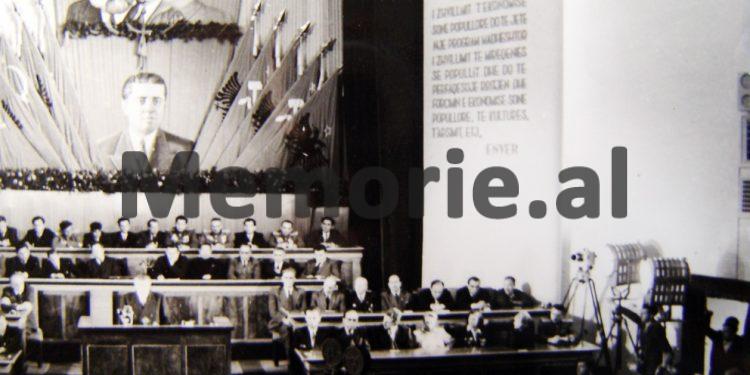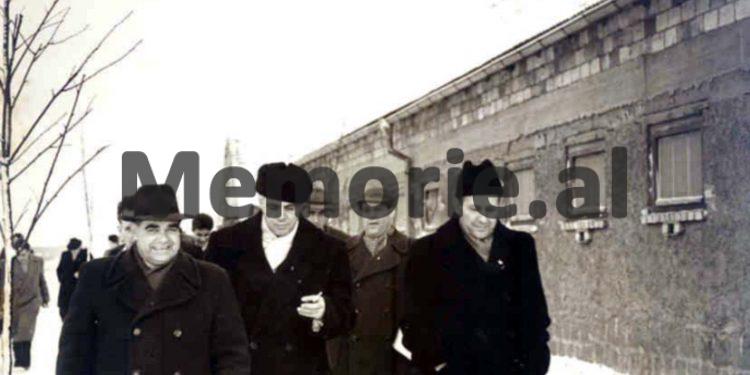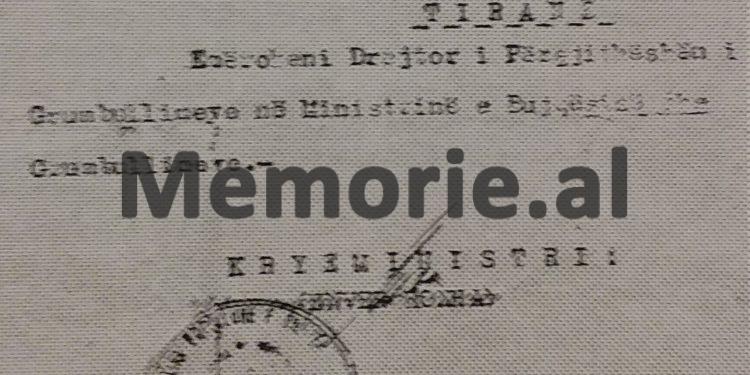Dashnor Kaloçi
Memorie.al publishes the unfamiliar story of the Party Conference for Tirana which was held at the Workshop Cinema from April 14 to 19, 1956, where some party organizations such as the New Albania Cinema Studio, Voice of Albania The people ”, Radio-Tirana, etc., raised numerous problems regarding the huge gap that had been created between the senior officials of the LLP leadership, the common people, and the many privileges that the members of the Political Bureau had. and government ministers.
Who were the delegates who issued the first accusations against the senior leadership of the ASP and the change the situation following Enver Hoxha’s arrival from Vlora and his entrance into the hall, which was greeted with applause and long ovations by most large of attendees? What were the accusations that Enver made to some of the delegates who had given the tone of that conference and the role of the Minister of Internal Affairs, Kadri Hazbiu, who was serving Enver… ?!
“Enver Hoxha’s arrival in the hall was greeted with great applause by all the delegates because we thought he would agree with the problems that arose on the first day of the Conference. On the second day of the proceedings of the Conference of Tirana, in the afternoon session came Enver Hoxha himself. He interrupted his vacation in Vlora after being informed of what was happening in Tirana. Enver’s entry was greeted with much applause, as we still believed he would agree with those problems that arose on the first day of the Conference. After Enver took over the situation and began to oppose Vehip Demi, Colonel, Iljaz Ahmeti, Director of the “New Albania” Cinema Studio, Nesti Zotos and several others who were regarded as the anti-party organizers of that conference, he addressed the hall saying: Did Ihsan Budo see this, this is a tremendous curious and he does his best and wants to know it all.
Ihsan Budo, former head of the Saranda district communists during the war years, the Albanian government representative in Italy for War Reparations and deputy minister of collection, testifies to Memorie.al, his participation as a delegate at the Party Conference. Tirana in 1956, where he was described as “the enemy of the enemy” and all the vices that came from him, being interned for 31 years in the Kurbnesh mines and sentenced to 10 years in prison.
follows from the previous number
Budo, who was labeled as the key leaders of that conference?
In addition to Hulusi Spahiu, Pajo Islamaj and Peco Fidhi, the 18 friends I mentioned above were delegates to the conference, were declared enemies, traitors, and antiparticles by the Conference resolution, and it was also officially made a secret affair where the chief secretary ASP Haxhi Kroi, referred to the Political Bureau as instructed by the Secretary of the ASP and the member of the Political Bureau Rita Marco, who signified us as such. I would like to emphasize that Enver Hoxha, upon his arrival in the Conference Room, realized that the criticisms made there were not separate criticisms of this or that disgruntled or careerist, but the accumulated resentment and anger that included not only communists and the masses of the people. In this context and the proceedings of that conference aroused great interest because the opposition that was being made was of a special kind. This was understood by Enver Hoxha, who was concerned as never before and engaged the Minister of Internal Affairs, Kadri Hazbiun, there, who interfered there with the methods he knew.
What were the interventions of Kadri Hazbiu?
Kadri Hazbiu, who immediately defended Enver Hoxha, addressed me saying: to go out into the podium and respond to what I had done, where according to him I had prepared and instructed the discussions of my friends Vehip Demi and Iljaz Ahmeti. He addressed me: What are the reasons why you personally prepared the discussions for them, leading them to vomit against the party? With that, Kadriu remembered that in my person he would reveal a so-called conspiracy against the party and the state.
How did you respond?
I replied, that what he said was not true at all. The same thing arose and said Vehip Demi. Kadri then went on to question me and accuse me of talking to Iljaz Ahmeti about the Conference and the conversation I had with Pellumb Dishnica in front of Stalin’s monument. I admitted that I had met Pellumbi, but that I had not discussed anything against the Party. Not satisfied with my answers, Manush Mufti stood up and asked me; what was my opinion about Hulusi Spahiu’s stay at the Yugoslav embassy.
Does this accusation, which is often said about that conference, have any truth, so what was it about?
It was rumored that during a dinner at that embassy, Hulusi Spahiu, who had been invited, had said: To raise a toast for the “People’s Hero” and Albania’s massacre, friend Tuk Jakova. I replied: I do not know what Husuli Spahiu said, better ask him yourself. At this moment, he spoke to Enver Hoxha himself, who addressed the plate: You see this Ihsan Budo, this is great courage, he does his best to know everything. After the words of Enver, the same question was bombed with friends Vandush Vinçani, Nesti Zoto, Vehip Demi, Iljaz Ahmeti.
There were other pressures on your address?
Seeing my steadfast attitude, the fourth night of the conference, the senior leadership after studying the circumstances of my friends, appointed Abdyl Këllez and Kiço Ngjela, thinking that as friends I had, it would fill my mind to make self-criticism. After taking a night stroll from the “Workshop” cinema to the “Dajti” hotel, I told them that I had no outside interference and that this was due to an injustice that occurred in the party and state apparatus. I broke up with the two friends, each having his own point of view. But that did not end there, because, during the other days of the Conference, Kadri Hazbiu with his Security men put a great deal of psychological pressure on us.
Specifically, what…?
All of us delegates who were considered to be the inspirers and organizers of that conference were faced with rigorous surveillance of Security personnel. I was personally followed by seven Security personnel. Kadri did this, thinking that he would unravel the strands of a great hostile conspiracy. This surveillance is nothing compared to a plan that had been drawn up for the execution of all of the persons on the Security lists, as the organizers of that conference, an execution that would take place inside the Conference Room. I learned this many years later in 1994, from Gjergj Balla, who until recently worked as a keeper of the Municipality of Tirana. George told me: “At the time of the Tirana Party Conference, I was on duty in the Republican Guard, me and some other guards, they set us aside and instructed us and dressed us in civilian clothes, armed us and then introduced us to the Conference. Each of us was assigned by a person whom they suspected to be anti-partisan, that at a given moment and according to the sign given to us, we would be killed.
What about the others in the room?
Yes, Kadriu approached Njazi Jahos asking, “On what platform is your discussion-based, your friend Njazi prepared, but you can be influenced”? Njazi coolly replied, “Yes, I am based on the Party platform and influenced by the 20th Congress of the Communist Party of the Soviet Union.” To break Nazi, they were then asked what he had talked to Kristo Themelko during the proceedings of the Conference. Given that Themelko was known and condemned as a Yugoslav philo, the Conference was surprised to receive that question.
How did Njazi respond?
Njaziu replied, “I do not answer this question, because it is a provocation.” He was followed by Kristo Themelko, who said: “It is not true that we have met, so nothing has been talked about.” This response created the hall’s laughter and laughter as they say, “There were a mountain and a rat.” In addition, many other questions and interventions were made during the conference such as Iljaz Ahmeti, Vehip Demi and Nesti Godon (Director of Kinostudio) who accused them of being anti-Yugoslav enemies who were influenced by Radio Voice of America and Radio London.
It was said that Bedri Spahiu also had a primary role in that Conference?
I’ve heard this, too, because for many years in various party lectures and communiqués condemning the Tirana Conference, it was said to be the result of a Tito-Khrushchev conspiracy, and an attempt to overthrow the leadership and restore capitalism. These lectures were so far as to accuse Bedri Spahiu of attending that conference, at a time when Bedri Spahiu was handcuffed by the dock saying: “I have had no connection with those of the Tirana Conference, but I am against to the dictatorship of Enver Hoxha and I’m sorry I wasn’t in that room among those brave ones. ”
What happened to you after the conference?
Following the conclusion of the Party Conference on Tirana, its materials were worked out in grassroots party organizations, and for all of us that the resolution of the Conference had declared us anti-party, enemies and traitors, we were commanded from above to discuss and a stand was taken by the respective organizations. In this context, I was called to the organization I was part of and although the orientation was to expel me from the party, the grassroots organization defended me with fanaticism. Given its position, even the Central Committee delegate, Shefqet Peci, did not use his authority to impose on the organization, although he knew the order of the Central Committee Secretary, Rita Marko, in a highly secret letter, no. 27, dated 24.4.1956, through the Head of the Central Committee Secretariat, Hadji Kroit, declared me an anti-partisan. Despite this document, the organization placed only one remark on the registration card.
So the punishment for you ended?
No, this was not the case, because on May 5, 1956, I, Njazi Jaho, Vehip Demi, Nesti Zoto, etc., were called to the meeting of the Bureau of the Party Committee of Tirana, in which the formality of our expulsion from the party was to be fulfilled. There, too, I had fierce debates with K.P’s second secretary, after being asked who I had met at the Dajti Hotel during the days of the Conference and who had come to my house in those days. After these debates where I did not accept anything, I was informed that I had been expelled from the party. Before leaving the office, I went to the Ministry to meet with my workmates. There I wanted to know the opinion of two Soviet advisers who worked with us, Klemenko and Budinkov. But I was too scared to meet them, that in those circumstances I could be called a Soviet agent. Anyway, I got the chance and met. They warmly welcomed me and said: We have all heard of it, so don’t worry, you have worked very well and you are not guilty of what happened. We were greeted and never saw them again.
Did you have any further consequences after that?
The expulsion from the party was the first measure to precede others that were state measures. I was then fired from all positions and expelled from the Democratic Front and Trade Union organization. After that, my wife and sister were fired and I was fired from my home. From Tirana, I was first sent to the sub-director of companies in Bulqiza. On the day they fired Dali Ndreu, Liri Gega, and Petro Bollati in November 1956, they also arrested Pajo Islam who had led him to work in Kurbnesh and sent me in exile instead. After allowing me some time to work as a normalized, I was then assigned a worker.
How did your life in Kurbnesh then turn out?
Even in the town of Kurbnesh where I was exiled with my wife and two young children, I was under strict surveillance by the State Security at every turn. But even in those extremely difficult situations where I was, we were not comfortable again. So on February 15, 1963, after 7 years and 6 months of internment, the State Security Service surrounded my home. The head of the Mirdita Interior Branch, with whom I fiercely debated, arrested me and, with a “Gaz” -69, sent me to Rrëshen. There, after reporting to the Vice President, the Branch President began to shout, “What brought you here this Khrushchevian revisionist and sworn enemy of the party and the popular power” ?! Then I was taken to the office of the President, where, along with his deputy, were two other strangers to me who had come from the Ministry of Interior.
What did those who came from the ministry tell you?
One of them answered and said to me, “We have come to meet you, a great fortune awaits you. Personally you care about Comrade Kadri. He has sent us to ask you some questions that depend on which you will answer honestly. ” Command and speak I told you. At first, he got the word that looked like the principal and started asking me: “Do you know Bedri Spahiu, Tahir Kadare, Hulisi Spahiu, Pajo Islam, Peco Kagjini, Kleo Bezhan, Njazi Jahon, Taho Sajko, Zihni Muco, and others”?!
How did you respond?
Yes, I replied, that everyone knows them and I had a close association with them. After my words, they were disfigured and started shouting at me, saying they are traitors and anti-parties. Then I took the floor again and told you that I had given you the answer and consideration that the party had had for them. After that, I again addressed you: “Tell Kadri Hazbi to tell the Party the truth about me, which he has done to this day.” After the words I said, the situation became very aggravated and I was ordered to leave that office and go to the vice president. I realized that they wanted to get in touch with Tirana by phone to get directions.
Were you called to the non-tea office where you were?
Soon after, they called me again and said, “We’re done with you, ordering you to try and reflect on what we asked you to write and send it to the Internal Affairs Branch here in Rrëshen.” I replied that I had nothing else to say. They told me to leave, but I opposed their order, telling you that I had been arrested there and was determined to stay in prison. I told you that in those conditions I was in Kurbnesh, prison would be better for me, because at least I had the bread safely, and in Kurbnesh we were missing because I was left out of work. So that conversation ended with them, and I made my way overnight to Kurbnesh, where my wife and children waited tensely. Many of the comrades attending the Party Conference, meanwhile, had been arrested or deported.
After that, did they call you back?
Yes, on December 7, 1963, while I was working outside the Copper Clearing Factory (I was not allowed to enter the factory), I was informed by the Branch that I had to show up in Tirana, for guidance. According to the instructions of the Branch, on December 8th, I came to Tirana at the Ministry of Interior, met three close friends, Banush Goxhaj, Filat Muço, and Ali Shtinon, who were very kind to me and called on me to reflect, I was told that they had called me to help me return to Tirana. I tried to convince them that my problem was not as they put it. I was with them after being told that the next day he was waiting for me at his Central Committee office, Comrade Hysni Kapo himself.
Did you meet Hysni Kapo and why did he call you?
To tell you the truth surprised by this strange surprise, I agreed to go to the meeting. Before the meeting, I was very excited. Novruz Malindi accompanied me to my friend Hysni. He cordially welcomed me and after asking about my family said to me: “From the information we have, you have been very good and the Party has thought to move you from Kurbneshi and you will be charged with state duty.” Following his words, I addressed: I was a party member from 1942 and a political prisoner of fascism. Hussein interrupted my speech, wishing I would not go further, trying to persuade me to reflect, not to remember the past. After talking and some, I broke up with Comrade Hysni, disagreeing with what he referred to. After that I was told to go to the Ministry of the Interior, where Major General Nevzat Haznedari addressed me with a sting and said: “What do you want, you dumb, evil enemy of Khrushchev’s revisionism”, and more then he ordered me to go to Rreshen, saying, “You are a dog and there you will rot.”
What did you do after the words that you have given Haznedari?
I left the ministry and asked to leave for Rreshen, but no car took me. According to the rules we had interned, I was brought back to the Tirana Directorate, where the guard officer linked up with the ministry and escorted me back to where Haznedari was waiting with Colonel Zavalani. As if nothing had happened four hours before, they stood up and hugged me, behaving very friendly to me. Then they told me: “Forget the Tirana Conference and gather your mind and try to reflect because the party will move you from Kurbneshi to take up a post. For this, he called you Hysni Kapo at his behest and made them by hand from the picture of Enver hanging on the wall. ”
What were you called for?
The purpose of my invitation from them was to rehabilitate me by assigning me to state duties, and on January 20, 1964, the Chairman of the State Collection Committee, sh. Spiro Pano, who cordially told me, “By the direction of leadership, you have been appointed Director at an Agricultural Farm.
How did you respond?
I flatly refused and headed to Kurbnesh. Upon arrival, the Factory Director told me to hand over the shovel that I had been fired. After a letter I made to Hysni Kapo about State Security’s attitude towards my family, they took me back to work and started treating me a bit better, appointing me a norm in the Well of Kurbnesh. In March 1972, contrary to my will, I was retired on a minimum wage, which I found very difficult.
With retirement, I believe you had no problems anymore?
No, my retirement got worse with my retirement, because on June 25, 1977, after 25 years of exile in Kurbnesh, I was arrested as an “enemy” on charges of “agitation and propaganda against the party and the popular power” and related they threw me down in front of the people of Kurbnesh to expose me. The trial took place at Kurbnesh Cinema and I was sentenced to 10 years in prison. As part of an amnesty, I was released from prison in 1982 and went back to my family home in Kurbnesh, where I continued to be under Security surveillance. I stayed in Kurbnesh until the end of 1990, returning to Tirana after 35 years of leaving. Memorie.al




